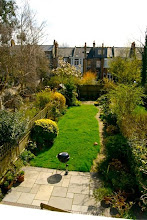
This week's bibliotherapy has particular resonance for me -- both because of its close relationship with my novel about Daphne du Maurier, and because of the last few months in my own life.
I'll be talking about 'The Breaking Point' at the Du Maurier festival in Fowey on May 10th. I hope to meet some of you there -- in person, or on this blog...
“There comes a moment in the life of every individual when reality must be faced,” wrote Daphne du Maurier in a prefacing note to her collection of short stories, ‘The Breaking Point’. “When this happens, it is as though a link between emotion and reason is stretched to the limit of endurance, and sometimes snaps.” The eight stories that followed are a clue to Du Maurier’s own breaking point, when she felt herself to be close to madness after her husband’s mental breakdown in July 1957, and her discovery of his affair. All are as disturbingly potent as her more famous short stories (‘Don’t Look Now’, ‘The Birds’), but perhaps the most intriguing is ‘The Blue Lenses’, set in a private nursing home like the one that admitted her husband, Boy Browning, when his collapse was kept secret from all but a handful of friends and family.
The patient in ‘The Blue Lenses’ is a woman, Marda West, recovering in ‘the anonymity of darkness’ after an operation on her eyes. As the bandages are removed, she sees everything – or rather, everyone – entirely differently. Her apparently loving husband now has a vulture’s head, threatening her with his ‘brooding eye, the blood-tipped beak, the flabby folds of flesh’; and the gentle-voiced nurse who has cared for her is a sinister snake, her ‘pointed barbed tongue swiftly thrusting and swiftly withdrawn’.
The medical staff are reassuring -- the operation had simply touched on a nerve (a reminder, perhaps, that the discreet label for Browning’s breakdown was ‘nervous exhaustion’), the surgeon makes an adjustment, and then explains, ‘the pressure threw out your balance’. But although the faces around her become human again, the story has a sinister ending: ‘Marda West took up the mirror and looked into it… The eyes that stared back at her were doe’s eyes, wary before sacrifice, and the timid deer’s head was meek, already bowed.’
‘The Blue Lenses’, and the rest of ‘The Breaking Point’, reflects a preoccupation with truth and deception, betrayal and divided loyalties, and the blurring of madness and sanity. Such is Du Maurier’s extraordinary skill as a writer that readers will follow as she teeters on the edge of the darkest abyss; but then she recovers her balance, and ours, again, and finds a way back from the brink.









18 comments:
I think I mentioned that I look forward to this column every week, but at the same time I feel a sense of despair as I contemplate my ever-growing list of things I must read. The other day my friend was commenting on my terrible habit of reading several books at once, the end result being I confuse them all.
brilliant post - thank you justine - i just hope you can find the resources to mend soon the breaking point in yourself - across the miles (i live in NZ) i am thinking of you
Truly fabulous cover of that edition. I feel like rereading those stories now. Hope all is well and the sunshine is still with you xx
I can't tell you how glad I am to see this - it's about the only thing that is missing from my Daphne collection! I have to agree with Kairu though, my TBR pile is now taller than I am, and I got very confused trying to explain the plot of 'To The North' to someone the other day, as I got three other books mixed in ... 'Cold Comfort Farm' is not too similar is it?
I hope you have overcome your own breaking point, Justine, and that your son is recovering from his stay in hospital.
I too am just finishing To the North and it is indeed great read. I will now read the Du Maurier short stories. I hope that you are on the mend and wish I could send you some South African sunshine as you have brought so much reading pleasure to me by your blogging. I wish you all that matters. Enid
Thanks so much, everyone. My son is recovering, and so am I... (if that's not tempting fate).
I found this lovely poem by Wislawa Szymborska, from the anthology A Book of Luminous Things. Somehow it made me think of you.
"In Praise of My Sister."
My sister does not write poems
and it's unlikely she'll suddenly start writing poems.
She takes after her mother, who did not write poems,
and after her father, who also did not write poems.
Under my sister's roof I feel safe:
nothing would move my sister's husband to write poems.
And although it sounds like a poem by Adam Macedonski,
none of my relatives is engaged in the writing of poems.
In my sister's desk there are no old poems
nor any new ones in her handbag.
And when my sister invites me to dinner,
I know she has no intention of reading me poems.
She makes superb soups without half trying,
and her coffee does not spill on manuscripts.
In many families no one writes poems,
but when they do, it's seldom just one person.
Sometimes poetry flows in cascades of generations, which sets up fearsome eddies in family relations.
My sister cultivates a decent spoken prose,
her entire literary output is on vacation postcards
that promise the same thing every year:
that when she returns,
she'll tell us, everything,
everything,
everything.
Justine you have got me on a Du Maurier kick - today I found a copy of The Parasites and wondered what you thought of it Enid
I love the poem -- thank you for sending it, it's so evocative and wry and affectionate and consoling.
Enid -- the Parasites is definitely worth reading, and has some intriguing autobiographical elements within it. Let me know how you get on with it.
A Book of Luminous Things is exactly that, a wonderful anthology of poems that are calming and comforting and yet sharply evocative, all chosen by Czeslaw Milosz, himself one of my favorite poets.
His last collection, Second Space, is a clear view at the end of a lifetime, when old age had most definitely not diminished his powers. Partly it is a meditation on loss, at surviving old friends and colleagues and his second, much younger wife, whom he mourns in the last poem, Orpheus and Eurydice.
Having just come back from a stage production of Dr. Jekyll and Mr. Hyde, I am off to keep myself awake all night with Stevenson!
I am devouring this book at the moment very very slowly and making every page last, I love, love, love Du Maurier and think this is (so far - it could go horribly wrong) my favourite collection of short stories by her. Wonderful blog and can see why this book is perfect.
I would like to use this space to thank Kairu for Wislawa Szymborska poem. I just recently discovered Szymborska, and this poem is marvelous...
"when she returns,
she'll tell us, everything,
everything,
everything."
Thanks
I've posted the Szymborska poem on my blog, because it's one I think more people should know of. Thanks for sharing it Kairu.
Interestingly, the most widely seen translation of Szymborska's poem is a little different from what I've posted here; it ends thus:
My sister has tackled oral prose with some success,
but her entire written opus consists of postcards from vacations
whose text is only the same promise every year:
when she gets back, she'll have
so much
much
much to tell.
I think I prefer the first one.
How I wish that I could join the Fowey confab!
I read your Daphne a couple of weeks ago, and can't get it out of my mind. Fascinating story. I'm undecided about whether to delve further into du Maurier or (finally) tackle Barker's Bronte biography.
I also wanted you to know that I've reviewed your book for a blogger book review club.
Bee -- I can highly recommend Juliet Barker's biography. Am doing a talk with her about Branwell at the Bronte Parsonage at the beginning of June, if you're in the neighbourhood!
Bulletin for the Center for Children's Books said that the book was "a dark drama of self-destruction that should make for grimly satisfying reading" while Voice of Youth Advocates called its characters "brilliantly twisted."
computer diploma | associate degree Teaching learning | Teaching Assistant diploma
hermes are considered as a perfect blend of aestheticism and royalty. There is nothing more catchy then carrying a handbag hermes . It is believed to be a status symbol for many and captures the attention of the onlooker. The handbags from handbags hermes like all other designers are tagged high because of their superior craftsmanship and excellent quality.
In this respect the best thing for you can be starting with the lida daidaihua which are available widely all over the world. The following are the benefits of daidaihua for which have gained wide popularity among the people who face a problem with their weights. The best part is lida slimming helps to keep your appetite in control which is very much essential. You must be know that slimming capsule is the craving for food that has lot of calories which makes us all the more fat. So by consuming the various products of this amazing slimming capsules you can keep everything under control. So, get one of the products for yourself and you will surely see the difference with the other slimming pills that you have been consuming lida for a long time.
Chanel Wallet price varies from hundred dollar bills to 1000 dollar bills. Your budget is what subjects the most, however anybody can afford Chanel handbags just in case you really want to as Chanel handbag 2010 not only leaves you the self-confidence and the prestige that gets with it but as well comes with the lifespan warrant in which you can replace the product in case of whatever scathe.
uk Tiffany had adorned a heirloom of the greatest of greatest kings, dainty damsels, handsome princes and petite princesses. Anybody who wishes to identify Tiffany pendants among this elite panel would definitely want to adorn themselves of this exquisite piece of silver necklaces . There is something strange about this piece of stone that has much folklore to silver pendants .
Post a Comment